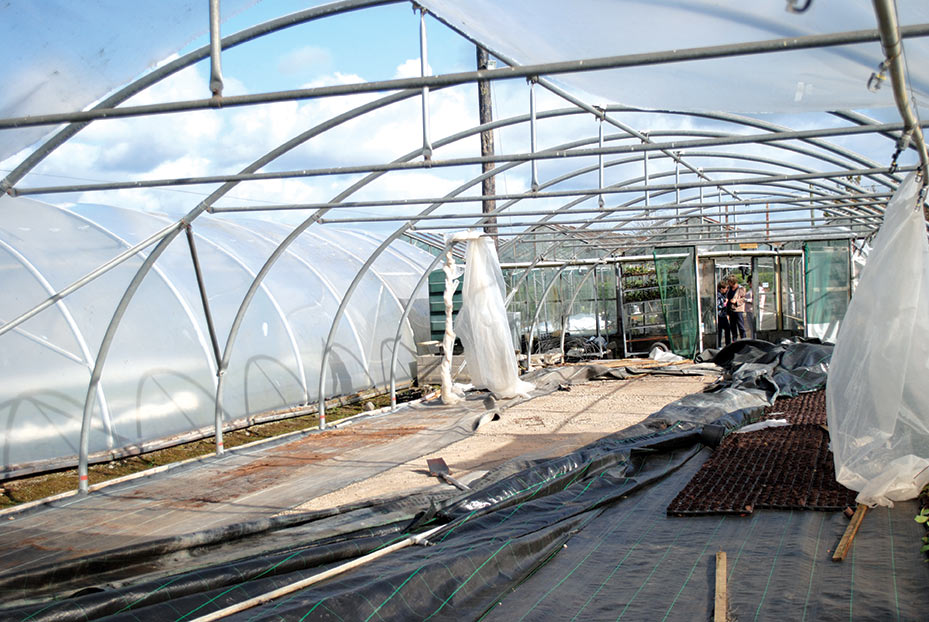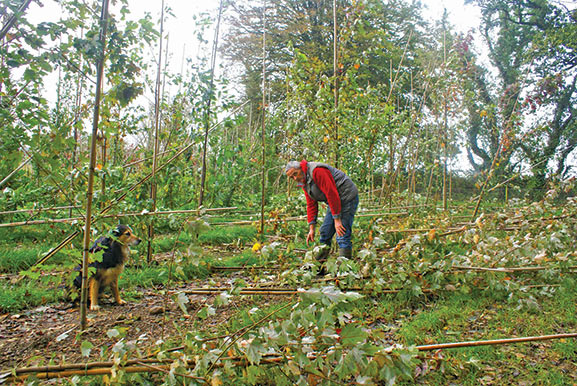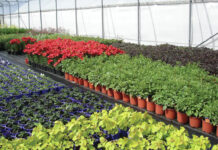The impact of the storm was felt across the country, but those most severely affected were in the South West of the country. “Gusts more than 130 km per hour ripped through rows of trees with devastating damage,” explained Joe Ahern, owner of Fana Nurseries, Co Cork. “Everywhere we looked there were trees down and bamboo broken. There could be as many as 10,000 trees with broken bamboo, and another 1,400 to 1,600 trees totally broken off at the base or halfway up the tree. My estimated cost of the damage at the moment is between €50,000-€60,000, ” he added. Joe has spent the last number of weeks repairing damage and getting on with lifting and planting. “All I can do is focus on the quality trees I have for sale, and with the upswing in the economy I remain positive that the future is looking brighter”.
 “The way the wind moved directions so quickly seems have done more damage than regular storms. New and old plastic were damaged equally,” commented Teagasc nursery stock advisor, Dónall Flanagan. “I spoke with one grower who lost a tunnel that had been reclad just six days previously, another who lost a multispan and three polytunnels, and another who sacrificed the plastic covers to save the structures.” In his capacity, Dónall has been able to get a broad insight into the nature and scale of the immediate and subsequent impact. Although he feels that structural damage was limited because of the forewarnings, the impacts are substantial and ongoing. “Labour access was a real challenge in the aftermath, caneing and tieing trees is a skilled job, tree lifting was starting the same week so pressure came from both sides”, he added.
“The way the wind moved directions so quickly seems have done more damage than regular storms. New and old plastic were damaged equally,” commented Teagasc nursery stock advisor, Dónall Flanagan. “I spoke with one grower who lost a tunnel that had been reclad just six days previously, another who lost a multispan and three polytunnels, and another who sacrificed the plastic covers to save the structures.” In his capacity, Dónall has been able to get a broad insight into the nature and scale of the immediate and subsequent impact. Although he feels that structural damage was limited because of the forewarnings, the impacts are substantial and ongoing. “Labour access was a real challenge in the aftermath, caneing and tieing trees is a skilled job, tree lifting was starting the same week so pressure came from both sides”, he added.
One nursery significantly impacted was Annaveigh Plants, owned and operated by John and Grainne Murphy. The nursery is one of the largest tree growers and suppliers in the country. Commenting to RTE, Grainne said, “It will require significant labour input. We’re talking in the hundreds of thousands to sort the whole thing out, when we work out the losses and the trees that are now unsaleable. In addition to that, we had many pre-booked orders for these trees and we’ve had to disappoint our customers.” Grainne also threw light on the wider concerns, highlighting the potential impact of changing weather patterns due to climate change.
Storm Ophelia is the latest in a succession of natural and manmade disasters, and she may well be remembered for revealing just how exposed the sector is. Not only are we exposed to negative economic, geographic and environmental factors beyond our control, the sector is afforded zero governmental support or protection. The sector was literally left swinging in the wind. The answer? A sustained, relentless, persistent and industry-wide collaborative lobbying campaign which articulates to policymakers just how important horticulture is. Don’t join a movement, start one.










